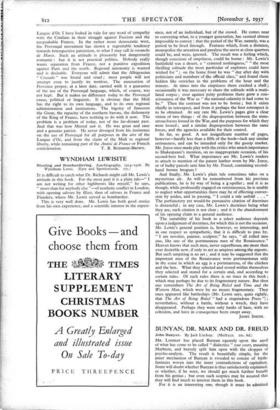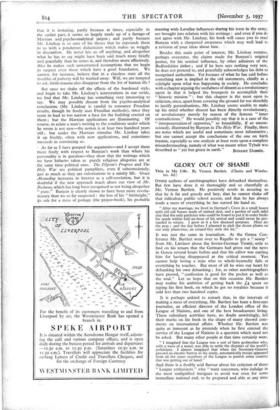BUNYAN , DR. MARX AND DR. FREUD
John Bunyan. By Jack Lindsay. (Methuen; los. 6d.)
MR. LINDSAY has placed Bunyan squarely upon the anvil of what has come to be called " dialectics " tout court, meaning Mattkism, and bravely split him open with the chopper of psycho-analysis. The result is beautifully simple, for the inner mechanism of Bunyan is revealed to consist of birth- fantasies woven into, the inner contradictions of capitalism. Some will doubt whether Bunyan is thus satisfactorily explained, or whether, if he were, we should get much further benefit from his genius ; but even such sceptics may be assured that they will find much to interest them in this book.
For it is an interesting one,- -though it must -be admitted that it is irritating, partly because at times, especially in the earlier part, it seems so largely made up of a farrago of Marxian and psycho-analytical jargon ; and partly because Mr. Lindsay is so sure of his theses that he expounds them to us with a ponderous didacticism which makes us wriggle in discomfort. He never lets us off anything, and altogether what he has to say might have been said much more briefly and gracefully than he utters it, and therefore more effectively. Also he makes such unwarranted assumptions that we begin to suspect even those which have a good foundation. We cannot, for instance, believe that in a classless state all the troubles of puberty will be washed away. Will, we are tempted to ask, birth-trauma also disappear from the list of human ills ?
But once we shake off the effects of the burdened style, and begin to take Mr. Lindsay's asseverations in our stride, we find that Mr. Lindsay has something very interesting to say. We may possibly dissent from the psycho-analytical conclusions (Mr. Lindsay is careful to renounce Freudian results, though he freely uses Freudian methods), since they seem to lead to too narrow a base for the building erected on them ; but the Marxian applications are illuminating. Of course, to relate a man's writing to the conditions under which he wrote is not new—the notion is at least two hundred years old ; but under the Marxian stimulus Mr. Lindsay takes it up freshly, often with new applications, and sometimes succeeds in convincing us.
- As far as I have grasped the arguments—and I accept them more freely with respect to Bunyan's work than where his personality is in question—they show that the writings which we have hitherto taken as purely religious allegories are at the same time political ones. The Pilgrim's Progress and The Holy War are political pamphlets, even if subconsciously, just as much as they are exhortations to a saintly life. Grace Abounding increases in interest as a self-revelation, but it is doubtful if the new approach much alters our view of Mr. Badman, which has long been recognised as not being altogether " pure." Bunyan is clearly shown to have been more revolu- tionary than we so far suspected : the loss of his " birthright," its sale for a mess of pottage (the prayer-book), his probable meeting with Levellerinfinences-duringtis -term in the army, are brought into relation with his writings : and even if you do not agree with Mr. Lindsay, his book will cause you to read )Bunyan with a sharpened awareness which may well lead to a revision of your ideas about him. • .
Besides this main point of interest, Mr. Lindsay restates, perhaps overstates, the claims made for Bunyan's original genius, for his seminal influence, by other admirers of the Bedfordshire tinker ; and if he here says nothing very new, he does not pretend to, and gracefully acknowledges his debt to recognised authorities. Yet because of what he has said before something new is implied- in-the old statements, chiefly as a sidelight upon what was happening in society. He concludes with a chapter arguing the usefulness of dissent as a revolutionary agent in that it helped the bourgeois to accomplish their " historic mission " : but this chapter is the most open to criticism, since, apart from covering the ground far too sketchily to justify generalisations, Mr. Lindsay seems unable to make up his mind whether dissent has been directly revolutionary, or revolutionary merely by reason of the famous " inner contradictions." He would possibly say that it is a case of the " interpenetration of opposites," so beautifully, if so uncon- sciously, illustrated by Bunyan in The Holy War. Finally, there are notes which are useful and sometimes most informative ; but one cannot accept the conclusions of the one on birth trauma, especially as one analysis at least rests upon a complete misunderstanding, namely of what was meant when Tybalt was
described as " yet but green in earth." BONAMY DOBREE.















































 Previous page
Previous page